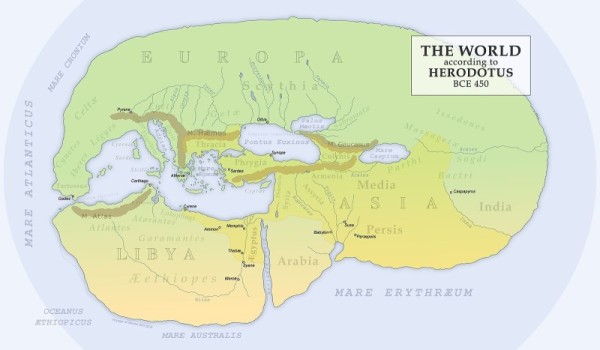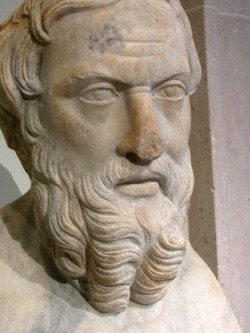Scythians plan to retreat before Persian’s advance, leaving scorched earth behind.

Translated by George C. Macaulay — our special project presenting the complete Herodotus with URLs for all of those people, places, events, and things which baffles and discourages modern readers.
Previously on Herodotus
116. The young men agreed to this also, and they crossed over the Tanais and made their way towards the rising sun for three days’ journey from Tanais, and also towards the North Wind for three days’ journey from the Maiotian lake: and having arrived at the place where they are now settled, they took up their abode there: and from thenceforward the women of the Sauromatai practice their ancient way of living, going out regularly on horseback to the chase both in company with the men and apart from them, and going regularly to war, and wearing the same dress as the men.
117. And the Sauromatai make use of the Scythian tongue, speaking it barbarously however from the first, since the Amazons did not learn it thoroughly well. As regards marriages their rule is this, that no maiden is married until she has slain a man of their enemies; and some of them even grow old and die before they are married, because they are not able to fulfil the requirement of the law.
118. To the kings of these nations then, which have been mentioned in order, the messengers of the Scythians came, finding them gathered together, and spoke declaring to them how the Persian king, after having subdued all things to himself in the other continent, had laid a bridge over the neck of the Bosphorus and had crossed over to that continent, and having crossed over and subdued the Thracians, was making a bridge over the river Ister, desiring to bring under his power all these regions also. “Do ye therefore,” they said,
by no means stand aloof and allow us to be destroyed, but let us become all of one mind and oppose him who is coming against us. If ye shall not do so, we on our part shall either be forced by necessity to leave our land, or we shall stay in it and make a treaty with the invader; for what else can we do if ye are not willing to help us? and for you after this it will be in no respect easier; for the Persian has come not at all less against you than against us, nor will it content him to subdue us and abstain from you. And of the truth of that which we say we will mention a strong evidence: if the Persian had been making his expedition against us alone, because he desired to take vengeance for the former servitude, he ought to have abstained from all the rest and to have come at once to invade our land, and he would thus have made it clear to all that he was marching to fight against the Scythians and not against the rest. In fact however, ever since he crossed over to this continent, he has compelled all who came in his way to submit to him, and he holds under him now not only the other Thracians but also the Getai, who are our nearest neighbors.”
119. When the Scythians proposed this, the kings who had come from the various nations took counsel together, and their opinions were divided. The kings of the Gelonians, of the Budinoi and of the Sauromatai agreed together and accepted the proposal that they should help the Scythians, but those of the Agathyrsians, Neuroi, Androphagoi, Melanchlainoi and Tauroi returned answer to the Scythians as follows:
If ye had not been the first to do wrong to the Persians and to begin war, then we should have surely thought that ye were speaking justly in asking for those things for which ye now ask, and we should have yielded to your request and shared your fortunes. As it is however, ye on the one hand made invasion without us into their land, and bare rule over the Persians for so long a time as God permitted you; and they in their turn, since the same God stirs them up, are repaying you with the like. As for us however, neither at that time did we do any wrong to these men nor now shall we attempt to do any wrong to them unprovoked: if however the Persians shall come against our land also, and do wrong first to us, we also shall refuse to submit: but until we shall see this, we shall remain by ourselves, for we are of opinion that the Persians have come not against us, but against those who were the authors of the wrong.”

CC BY-SA 2.0 image from Wikipedia.
120. When the Scythians heard this answer reported, they planned not to fight a pitched battle openly, since these did not join them as allies, but to retire before the Persians and to drive away their cattle from before them, choking up with earth the wells and the springs of water by which they passed and destroying the grass from off the ground, having parted themselves for this into two bodies; and they resolved that the Sauromatai should be added to one of their divisions, namely that over which Scopasis was king, and that these should move on, if the Persians
turned in that direction, straight towards the river Tanaïs, retreating before him by the shore of the Maiotian lake; and when the Persian marched back again, they should come after and pursue him. This was one division of their kingdom, appointed to go by the way which has been said; and the other two of the kingdoms, the large one over which Idanthyrsos was king, and the third of which Taxakis was king, were to join together in one, with the Gelonians and the Budinoi added to them, and they also were to retire before the Persians one day’s march in front of them, going on out of their way and doing that which had been planned. First they were to move on straight for the countries which had refused to give their alliance, in order that they might involve these also in the war, and though these had not voluntarily undertaken the war with the Persians, they were to involve them in it nevertheless against their will; and after that they were to return to their own land and attack the enemy, if it should seem good to them in council so to do.
– Herodotus, Book IV
| <—Previous | Master List | Next—> |
Herodotus made his living by being interesting. In a world where most people did not read and could not afford to buy a book even if they could, they would pay to listen to Herodotus recite from his books. They would not pay to be bored. In that world, the names that populate his stories would have some general familiarity to his audience. Their obscurity to us is a barrier that this series seeks to break down.
MORE INFORMATION
MAP LIBRARY
Because of lack of detail in maps as embedded images, we are providing links instead, enabling readers to view them full screen.

Leave a Reply
You must be logged in to post a comment.